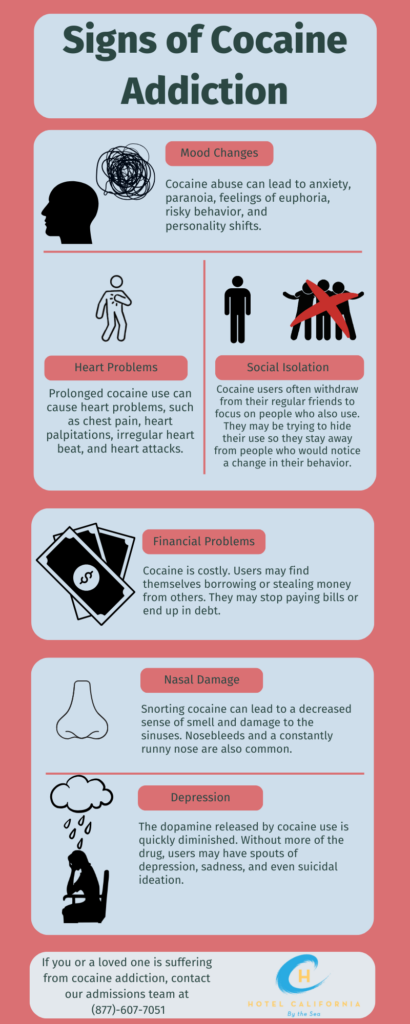How to come down from a Cocaine High
Cocaine is a powerful central nervous system stimulant that prompts the brain to artificially elevate dopamine levels in the body. The Schedule II controlled substance is derived from the coca plant native to South America and holds a high risk for abuse and addiction. Cocaine produces brief but intense initial feelings of euphoria, pleasure and increased energy. Once these effects begin to wear off, the body reacts to the sharp decline in dopamine, which can result in the development of uncomfortable negative symptoms. This is often referred to as a cocaine comedown.

A cocaine comedown is characterized by feeling the effects of the drug gradually wearing off after a period of intense high and intoxication. During a comedown, users can experience both psychological and physical symptoms. In users with heavy use or long-term use patterns, the comedown can be very painful and uncomfortable.
In cases of dependence and addiction, these users are more likely to continue use in order to prevent experiencing a comedown. This binge and crash pattern of use is done to sustain their cocaine high. However, this also increases the risk of developing a dangerous addiction. This is because users will need higher doses, higher amounts or more frequent doses in order to maintain that euphoric feeling.
What is a Cocaine comedown?
Why do cocaine comedowns occur? What is happening to the brain and body? When your body is forced to return to normal levels, the abruptness can cause unpleasant feelings and sensations. This is a cocaine comedown.
It is a term used to describe the after-effects of a stimulant drug. A cocaine comedown happens when the brain is attempting to restore balance after the intense artificial surge of dopamine that was caused by cocaine use. Cocaine triggered intense stimulation to the brain. The sudden abrupt shift of neurochemical levels can result in the body scrambling to bring itself back to normal levels and in the process cause an onset of depression, fatigue, irritability and anxiety. Fortunately, a cocaine comedown is a temporary and short-lived process.
The intensity and duration of a cocaine comedown are dependent on how much cocaine you took, whether or not you took other drugs, the strength and potency of cocaine and your drug tolerance levels. If the cocaine intoxication experience was very intense making the user feel uncomfortable, anxious or even delusional, the comedown may be mild in comparison. In other cases, experiencing a comedown can result in a return to reality, causing the user to engage in further drug use. This is in order to avoid unpleasant comedown symptoms.
The duration of a cocaine comedown varies from person to person. But it generally lasts from a few hours to a couple of days.

Symptoms of a Cocaine comedown
A cocaine comedown can result in an extreme shift in mood. This is because the sensations of the drug effects are beginning to wear off. The sudden depletion of dopamine contributes to the negative emotional state of mind during the comedown. A cocaine comedown can affect a user’s mood, motivation and energy levels.
- Anxiety and depression
- Lack of motivation
- Fatigue and lethargy
- Irritability and agitation
- Cocaine drug cravings
- Decreased concentration
- Increased or reduced appetite
- Disturbed sleep and insomnia
- Chest pains and aches
- Foggy thinking
- Nausea, diarrhea and dizziness
- Paranoia and panic attacks
- Exhaustion
- Suicidal thoughts, feelings of guilt and shame
- Feelings of hopelessness
- Headaches
- Risk for addiction
- Risk of cardiovascular diseases
- Delusions and hallucinations
- Damages to the nose, mouth, respiratory system, digestive system, kidney and liver
Crashing is another term used to describe having a cocaine comedown. Crashing is the feeling of intense exhaustion after using a highly stimulating drug such as cocaine. The body crashes as it tries to recover from the effects of overexertion, lack of sleep and other events that happen during a cocaine euphoria high.
Check Your Insurance Coverage for FREE
Find out if your insurance covers addiction treatment in minutes. We accept most insurance!
How to come down from Cocaine
One of the most dangerous side effects that can happen when experiencing a cocaine comedown is drug cravings and a high risk for relapse. There are some ways to help manage an unpleasant cocaine comedown.
- Look after yourself physically – eat, rest and drink plenty of water
- Daily exercising can help naturally release happy chemicals into the brain and body
- Adopt a healthy diet and take vitamins and supplements as appropriate
- Engage in new hobbies and activities
- Practice stress avoidance, meditation and mindfulness
- Plan and develop good sleep hygiene
- Turn to holistic strategies
- Know how long a drug will stay in your system
- Be around someone you trust if you are going to use cocaine
- Try to avoid using cocaine
- Be kind to yourself – drug abuse and addiction is a disease and can be difficult to overcome
Cocaine Comedown vs Cocaine Withdrawal
Cocaine comedown and cocaine withdrawal may seem like similar events. However, they are quite different. A cocaine comedown is a short-lived experience that occurs after the immediate effects of cocaine wear off. Withdrawal is a long-term process that occurs with consistent and heavy use of cocaine.
Symptoms from a cocaine comedown have a quick onset, temporary range and can be uncomfortable. The symptoms can subside just as quickly as they appear and often only linger for a day or two. When it comes to withdrawal symptoms, these tend to last much longer and can be more challenging to manage.
Anyone who uses cocaine can experience a cocaine comedown. But, cocaine withdrawal usually only occurs in users who have developed a physical addiction. When they suddenly stop taking the drug or have drastically reduced the amount of the drug, withdrawal can occur. Withdrawal symptoms can persist for weeks and often require professional intervention for the safety and efficiency of recovery from cocaine abuse.
Reach out to Hotel California by the Sea
We specialize in treating addiction and other co-occurring disorders, such as PTSD. Our Admissions specialists are available to walk you through the best options for treating your addiction.
Treatment for Cocaine Abuse
When taking cocaine, users will get a rush of pleasurable feelings and results in a more extroverted, talkative and alert personality. All cocaine users will experience a comedown after the initial feelings of euphoria. Despite that, users can experience them differently and at different intensities. Professional behavioral health programs such as Hotel California by the Sea provide a safe and secure environment for clients to treat their cocaine addiction and recover.
We specialize in treating substance use disorders such as cocaine and stimulant use disorder. We offer all levels of care including detox, residential, PHP and IOP. We will work with each client to create a comprehensive care plan to fit the needs of their addiction and recovery goals. We also utilize evidence-based treatments to help our clients better understand the intricacies of their addiction. Treatment methods such as CBT, DBT and group therapy have resulted in higher and more successful chances of overcoming their addiction. In addition to access to medication-assisted treatments and cognitive group and individual therapies, clients will also have access to social services that may be beneficial for those who live in the city. Hotel California by the Sea is committed to helping all clients with a cocaine addiction, recover and live a healthier life in sobriety.
References:
https://nuviewtreatment.com/cocaine-comedown/
https://www.verywellmind.com/comedown-crash-rebound-effect-after-drugs-4171269
https://adf.org.au/insights/drug-comedowns/
https://guardianrecovery.com/addiction-treatment/cocaine-abuse-addiction/what-is-cocaine-comedown-crash/https://www.help4addiction.co.uk/cocaine-comedown-vs-cocaine-withdrawal/
https://www.addictionadvocates.com/addiction-treatments/how-to-beat-a-comedown/
